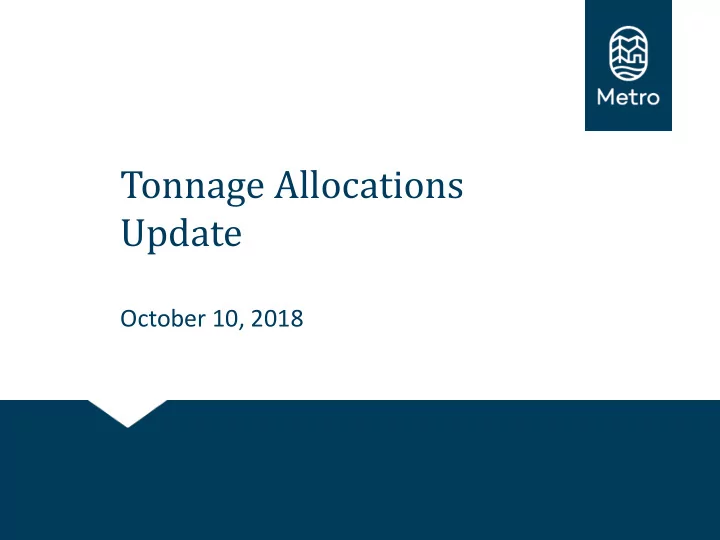

Tonnage Allocations Update October 10, 2018
Today’s discussion • Background to the proposed approach • Council Ordinance and the overall Tonnage Allocation approach • Summary of enhancements • Next steps • Discussion
Background • Metro Council adopted the Transfer System Configuration Policy in July 16 (Resolution 16-4716): – Establish tonnage allocations in percentages so that all allocations change proportionally as regional tonnage rises or falls – Establish a predictable and transparent framework for adjusting tonnage allocations that Council could adopt as a policy – Promote more efficient off-route travel to reduce greenhouse gases and minimize travel time – Accommodate future changes and new technology – Support small businesses – Utilize the regional transfer system and require that all landfill-bound waste use the region’s transfer stations – Improve rate transparency at public and private stations
Background • Minimum of 40% of the region’s wet waste will flow to public stations • No more than 40% of the region’s wet waste can be transferred by any single company
Background • Currently, there is no systematic method for allocation of Metro’s waste to the private stations. • Allocations are not always predictable, often require ongoing negotiations with private operators, and make no claim to promote system efficiency. • Current allocations do not account for regional population shifts or growth nor for adding (or removing) transfer stations in the system. • Staff does not believe that the current approach to allocating waste serves the public’s interest.
Council Ordinance and the Tonnage Allocation Approach • The Tonnage Allocation Approach is Framework + Methodology • Tonnage Allocation Framework: Metro Code Chapters 5.00, 5.01, 5.05 – For consideration by Council November 2018 • Tonnage Allocation Methodology: Administrative Rules – Draft rules included now as a preview – To be finalized winter/spring 2018-19
Summary of enhancements • Evaluate additional data and enhance the model – Changed to morning peak hour travel • Allow limited allocations to out-of-region transfer stations • Metro may shift or assign additional tonnage to private transfer stations – Metro to review applications on an annual basis • Metro may make changes based on significant disruptions
Next steps • October 16 – Meeting with stakeholders • November 1 – Materials finalized for Council • November 15 – Council 1 st Reading and public hearing • November 29 – Council 2 nd Reading and vote • Winter/Spring – Finalize Administrative Rules
Discussion • Do you have comments or suggestions on this direction?
Thank you
Recommend
More recommend